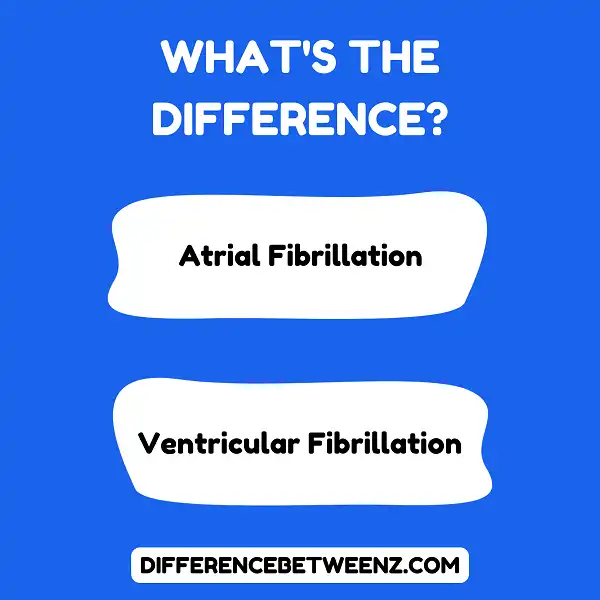What is the difference between atrial and ventricular fibrillation? This is a question that many people have but may not know where to find the answer. In this blog post, we will explore the differences between these two types of arrhythmias. We will also discuss the symptoms and treatments for each condition. So, if you are curious about the difference between atrial and ventricular fibrillation, or you want to learn more about these conditions, keep reading!
What is Atrial Fibrillation?
Atrial fibrillation, or Afib, is a heart condition that causes an irregular and often rapid heart rate. Afib can occur sporadically, or it may be a chronic condition. Although Afib is not usually life-threatening, it can lead to serious complications, such as stroke. Atrial fibrillation occurs when the heart’s two upper chambers (the atria) beat out of sync with the lower chambers (the ventricles).
This causes the heart to pump less efficiently and can lead to a host of symptoms, including chest pain, shortness of breath, fatigue, and dizziness. Although Afib can occur in people of any age, it is more common in older adults. In most cases, Afib can be managed with lifestyle changes and medication. However, in some cases, surgery may be necessary to correct the problem.
What is Ventricular Fibrillation?
Ventricular fibrillation is a condition in which the heart’s ventricles contract erratically, causing an irregular heartbeat. Ventricular fibrillation can be caused by a variety of factors, including heart disease, electrolyte imbalances, and certain medications. In most cases, ventricular fibrillation is considered a medical emergency, as it can lead to cardiac arrest and death. Treatment for ventricular fibrillation typically includes electric shock therapy (cardioversion), which helps to restore the heart’s normal rhythm. In some cases, additional treatments, such as antiarrhythmic medication or pacemaker implantation, may be necessary. Ventricular fibrillation is a serious condition that requires prompt medical treatment.
Difference between Atrial and Ventricular Fibrillation
Atrial and ventricular fibrillation are two types of arrhythmias or abnormal heart rhythms.
- As the name suggests, atrial fibrillation originates in the atria, or upper chambers of the heart, while ventricular fibrillation begins in the ventricles or lower chambers. Both conditions can cause the heart to beat erratically and may lead to serious complications, such as stroke or cardiac arrest.
- While atrial and ventricular fibrillation shares some similarities, there are also some important differences between the two conditions. For example, atrial fibrillation is often caused by other underlying health conditions, such as heart disease, whereas ventricular fibrillation is often triggered by a sudden change in heart rate or blood pressure.
- In addition, atrial fibrillation can usually be treated with medication or electrical cardioversion, while ventricular fibrillation is a medical emergency that requires immediate treatment with defibrillation.
By understanding the difference between atrial and ventricular fibrillation, you can be better prepared to identify and treat these potentially life-threatening conditions.
Conclusion
Ventricular fibrillation is a more serious condition that can lead to cardiac arrest and sudden death. Knowing the difference between atrial and ventricular fibrillation is important for understanding how each condition affects the heart. If you experience any of the symptoms of either condition, it’s important to seek medical help right away.


